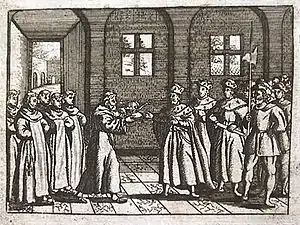855
Year 855 (DCCCLV) was a common year starting on Tuesday (link will display the full calendar) of the Julian calendar.
| Millennium: | 1st millennium |
|---|---|
| Centuries: | |
| Decades: | |
| Years: |
| 855 by topic |
|---|
| Leaders |
|
| Categories |
|
| Gregorian calendar | 855 DCCCLV |
| Ab urbe condita | 1608 |
| Armenian calendar | 304 ԹՎ ՅԴ |
| Assyrian calendar | 5605 |
| Balinese saka calendar | 776–777 |
| Bengali calendar | 262 |
| Berber calendar | 1805 |
| Buddhist calendar | 1399 |
| Burmese calendar | 217 |
| Byzantine calendar | 6363–6364 |
| Chinese calendar | 甲戌年 (Wood Dog) 3551 or 3491 — to — 乙亥年 (Wood Pig) 3552 or 3492 |
| Coptic calendar | 571–572 |
| Discordian calendar | 2021 |
| Ethiopian calendar | 847–848 |
| Hebrew calendar | 4615–4616 |
| Hindu calendars | |
| - Vikram Samvat | 911–912 |
| - Shaka Samvat | 776–777 |
| - Kali Yuga | 3955–3956 |
| Holocene calendar | 10855 |
| Iranian calendar | 233–234 |
| Islamic calendar | 240–241 |
| Japanese calendar | Saikō 2 (斉衡2年) |
| Javanese calendar | 752–753 |
| Julian calendar | 855 DCCCLV |
| Korean calendar | 3188 |
| Minguo calendar | 1057 before ROC 民前1057年 |
| Nanakshahi calendar | −613 |
| Seleucid era | 1166/1167 AG |
| Thai solar calendar | 1397–1398 |
| Tibetan calendar | 阳木狗年 (male Wood-Dog) 981 or 600 or −172 — to — 阴木猪年 (female Wood-Pig) 982 or 601 or −171 |

Emperor Lothair I divides Middle Francia between his three sons (Treaty of Prüm).
Events
Byzantine Empire
- November 20 – Theoktistos, co-regent of the Empire on behalf of 15-year old Emperor Michael III, is murdered on the orders of Michael.
Central Europe
- September 29 – Emperor Lothair I dies after a 15-year reign (co-ruling with his father Louis the Pious until 840). He divides the Middle Frankish Kingdom between his three sons in an agreement called the Treaty of Prüm—the eldest, Louis II, receives the northern half of Italy and the title of Holy Roman Emperor. The second, Lothair II, receives Lotharingia (the Low Countries and Upper Burgundy). The youngest, Charles, receives Lower Burgundy and Provence.
Britain
- Spring – King Æthelwulf of Wessex decides to go on a pilgrimage to Rome, accompanied by his youngest son Alfred (age 6) and a large retinue.[1] He divides the kingdom between his two eldest sons; Æthelbald receives the western part of Wessex, while Æthelberht becomes ruler over Kent, Surrey, Sussex and Essex.[2]
Abbasid Caliphate
Religion
- July 17 – Pope Leo IV dies after an 8-year reign, and is succeeded by Benedict III as the 104th pope of Rome. Anastasius is made anti-pope by Lothair I.
- Æthelwulf grants churches in Wessex the right to receive tithes. He gives one-tenth of his lands to the Church.[4]
- The Slavic alphabet is created by Saints Cyril and Methodius.
Births
Deaths
- July 17 – Leo IV, pope of the Catholic Church (b. 790)
- September 20 – Gozbald, abbot and bishop of Würzburg
- September 29 – Lothair I, Frankish king and emperor (b. 795)
- November 20 – Theoktistos, Byzantine chief minister
- December 8 – Drogo of Metz, illegitimate son of Charlemagne (b. 801)
- Ahmad ibn Hanbal, Muslim scholar and theologian (b. 780)
- Boso the Elder, count of Turin and Valois
- Cyngen ap Cadell, king of Powys (Wales)
- Elisedd ap Cyngen, king of Powys (Wales)
- Pepin, count of Vermandois (approximate date)
- Sahnun ibn Sa'id, Muslim jurist (or 854)
- Sico II, prince of Salerno (Italy)
References
- Abels 1998, p. 72.
- Paul Hill (2009). The Viking Wars of Alfred the Great, p. 17. ISBN 978-1-59416-087-5
- Ter-Ghewondyan 1976, pp. 83–86.
- Stevenson 1904, p. 186.
Sources
- Abels, Richard (1998). Alfred the Great: War, Kingship and Culture in Anglo-Saxon England. Harlow, UK: Longman. ISBN 0-582-04047-7.
- Stevenson, William Henry (1904). Asser's Life of King Alfred. Oxford, UK: Clarendon Press. OCLC 1354216.
- Ter-Ghewondyan, Aram (1976) [1965]. The Arab Emirates in Bagratid Armenia. Translated by Nina G. Garsoïan. Lisbon: Livraria Bertrand. OCLC 490638192.
This article is issued from Wikipedia. The text is licensed under Creative Commons - Attribution - Sharealike. Additional terms may apply for the media files.